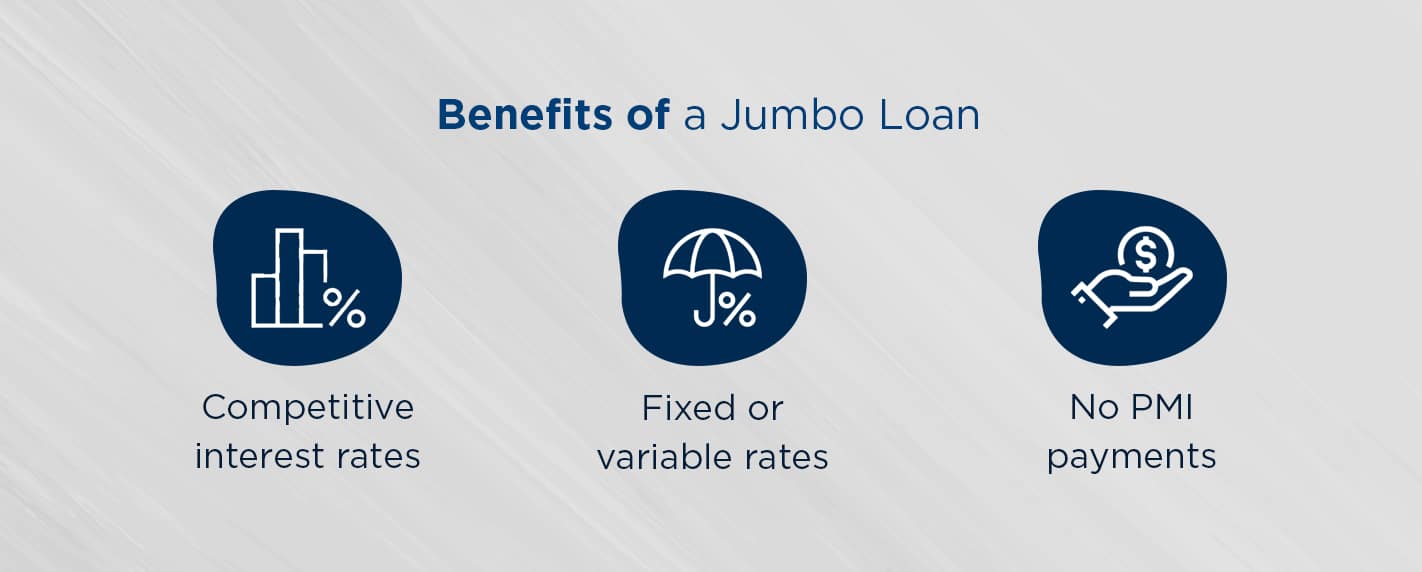Optimize Your Buying Power with a Jumbo Loan for High-End Residences
Optimize Your Buying Power with a Jumbo Loan for High-End Residences
Blog Article
Browsing the Jumbo Financing Landscape: Essential Insights for First-Time Homebuyers
Navigating the complexities of jumbo loans offers a special collection of difficulties for new property buyers, particularly in a progressing property market. Comprehending the necessary eligibility demands and prospective advantages, alongside the downsides, is vital for making informed choices. Furthermore, developing a strong financial strategy can considerably boost your leads. Engaging with professionals in the field can illuminate paths that might at first seem discouraging. As you discover these complexities, it becomes clear that a much deeper understanding can reveal possibilities that may or else be ignored. How can you best position on your own for success in this specialized segment of borrowing?
Understanding Jumbo Lendings

Due to the fact that big lendings are not backed by government-sponsored entities, they lug various underwriting criteria and need more detailed financial paperwork. This difference can lead to higher rates of interest compared to traditional financings, provided the raised risk to loan providers. Jumbo financings likewise use one-of-a-kind advantages, such as the capability to fund higher-value residential properties and possibly much more adaptable terms.
Newbie buyers must also understand that securing a jumbo finance typically necessitates a larger down payment, generally varying from 10% to 20%. Additionally, debtors are generally expected to show solid credit reliability and a stable revenue to qualify. Comprehending these subtleties can encourage first-time property buyers to make informed choices when discovering jumbo funding alternatives in their pursuit of homeownership.
Qualification Demands
Protecting a big financing needs conference details qualification demands that differ substantially from those of conventional lendings. Unlike traditional finances, which are often backed by government-sponsored entities, jumbo car loans are not insured or guaranteed, resulting in stricter requirements.
Furthermore, debtors should demonstrate a durable monetary profile, which includes a reduced debt-to-income (DTI) ratio, generally no greater than 43%. This makes certain that debtors can manage their regular monthly payments along with other financial commitments.
Moreover, many lending institutions require significant paperwork, consisting of proof of income, property statements, and income tax return for the past two years. A substantial deposit is additionally vital; while traditional lendings may permit deposits as reduced as 3%, big fundings often require at the very least 20%, depending on the lender and the finance quantity.
:max_bytes(150000):strip_icc()/dotdash_Final_Jumbo_Loan_May_2020-01-d552693b65b74099bf1c6cd4d300cc5a.jpg)
Advantages of Jumbo Loans
For many novice homebuyers, jumbo car loans use unique advantages that can help with the journey toward homeownership. One of the primary benefits is the ability to finance homes that surpass the adapting finance restrictions set by government-sponsored entities. This adaptability makes it possible for purchasers to access a broader variety of high-value buildings in affordable genuine estate markets.
Furthermore, jumbo car loans often feature eye-catching rate of interest rates that can be lower than those of typical finances, particularly for customers with strong credit scores profiles. This can cause substantial visite site financial savings over the life of the financing, making homeownership a lot more affordable. Jumbo loans generally allow for higher funding amounts without the requirement for exclusive home loan insurance policy (PMI), which can additionally reduce overall costs and regular monthly settlements.

Possible Downsides
Several prospective property buyers may find that jumbo fundings included considerable drawbacks that warrant careful factor to consider. Among the main issues is the strict qualification criteria. Unlike adjusting financings, big financings commonly call for higher credit history, frequently exceeding 700, and significant earnings documentation, making them much less obtainable for some debtors.
Furthermore, big fundings normally feature higher rate of interest contrasted to traditional financings, which can result in enhanced month-to-month settlements and overall borrowing prices. This costs may be particularly troublesome for new property buyers who are currently navigating the economic complexities of purchasing a home.
Another remarkable disadvantage is the bigger down payment need. Numerous lending institutions expect a minimum deposit of 20% or more, which can present a challenge for purchasers with minimal cost savings. The absence of government backing for jumbo financings leads to less desirable terms and problems, increasing the danger for loan providers and, subsequently, the loaning costs for property owners.
Finally, market variations can dramatically affect the resale worth of premium residential properties funded with big loans, adding an element of monetary unpredictability that newbie property buyers might locate daunting.
Tips for First-Time Homebuyers
Navigating the complexities of the homebuying procedure can be overwhelming for novice purchasers, especially when thinking about jumbo fundings (jumbo loan). To streamline this trip, adhering to some essential techniques can make a considerable difference
First, educate yourself on jumbo car loans and their particular demands. Understand the different borrowing standards, consisting of credit rating scores, debt-to-income proportions, and deposit assumptions. Normally, a minimum credit history of 700 and a deposit of at least 20% are essential for authorization.
2nd, involve with a well-informed mortgage specialist. They can give understandings customized to your financial situation and help you navigate the details of the big finance landscape.
Third, think about pre-approval to strengthen your investing in placement. A pre-approval letter signals to sellers that you are a significant purchaser, which can be beneficial in affordable markets.
Last but not least, do not ignore the significance of budgeting. Consider all expenses related to homeownership, including real estate tax, maintenance, and house owners' insurance coverage. By complying with these ideas, newbie purchasers can approach the jumbo lending procedure with better self-confidence and clearness, improving their possibilities of successful homeownership.
Conclusion
In conclusion, browsing the jumbo loan landscape calls for an see extensive understanding of qualification requirements, advantages, and potential downsides. Ultimately, complete preparation and education and learning regarding jumbo loans can lead to even more informed decision-making in top article the homebuying procedure.
When browsing the complexities of the real estate market, understanding jumbo loans is critical for novice property buyers intending for residential or commercial properties that go beyond conventional funding limits. Big car loans are non-conforming financings that usually go beyond the conforming funding restriction established by the Federal Housing Finance Company (FHFA)Furthermore, big loans typically come with eye-catching interest prices that can be reduced than those of conventional car loans, especially for borrowers with strong credit history profiles. Big financings commonly allow for greater finance amounts without the need for personal mortgage insurance policy (PMI), which can even more lower monthly payments and overall prices.
Unlike conforming lendings, jumbo loans typically call for greater debt ratings, typically surpassing 700, and substantial revenue documents, making them less accessible for some borrowers.
Report this page